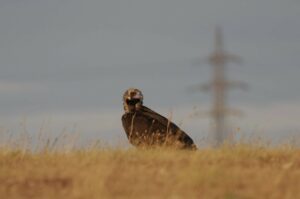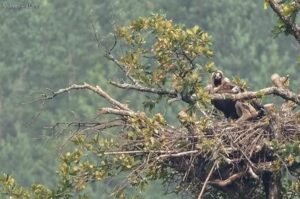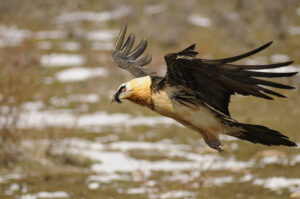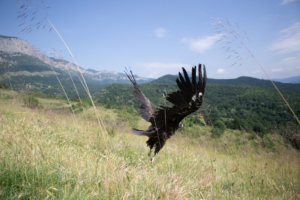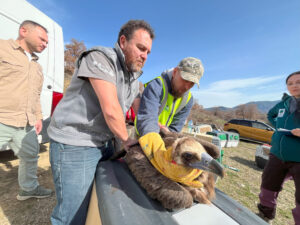
| Project period | August 2023 to July 2030 |
|---|---|
| Project area | Balkans (Bulgaria, Romania) |
| Target species | Bearded Vulture and Cinereous Vulture |
The Bearded Vulture LIFE project intends to build upon the significant conservation achievements of previous vulture LIFE projects conducted in Bulgaria. Undoubtedly, the primary successes include successfully reintroducing the Griffon Vulture to the Balkan Mountains and resurrecting the Cinereous Vulture from extinction. The new project unites eight partners with the ultimate objective of reestablishing the historical distribution of Bearded and Cinereous Vultures in the Balkans. This will be accomplished through strategically reintroduced and autochthonous populations, thereby facilitating the restoration of genetic connectivity between Western Europe and Africa and Asia. This goal aligns with the objectives outlined in the relevant European Species Action Plans, the Multi-species Action Plan for the Conservation of African-Eurasian Vultures, and the EU Biodiversity Strategy for 2030.
LEARN ABOUT THE TARGET SPECIES
With funding from the European Union’s LIFE programme, the project aims to reintroduce the Bearded Vulture and strengthen the Cinereous Vulture population in Bulgaria by leveraging European expertise, improving nesting conditions, bolstering the food supply, aiding local breeders, promoting sustainable animal husbandry, mitigating threats, and reinforcing national capabilities for reintroduction efforts. Ultimately, the project aims to establish a Bearded Vulture population in Bulgaria/Balkans and fortify the existing Cinereous Vulture population, while also initiating a vulture recovery programme in Romania.
IMPROVING NESTING CONDITIONS
The project is dedicated to improving nesting conditions for Cinereous Vultures through the strategic placement of artificial nesting platforms and piloting forest management techniques aimed at creating sustainable nesting habitats, ensuring the long-term success of the Cinereous Vulture population.

IMPROVING FOOD BASE
The project is focused on enhancing the vultures’ food sources through verious initiatives. First, it provides support to local animal breeders, encouraging extensive breeding practices to ensure a steady supply of food for vultures. Wild populations of prey species will also be reinforced in critical areas, with the release of the Balkan Chamois in the Sinite Kamani Nature Park and directed conservation actions to strengthen rock partridge, tortoise and European souslik populations.
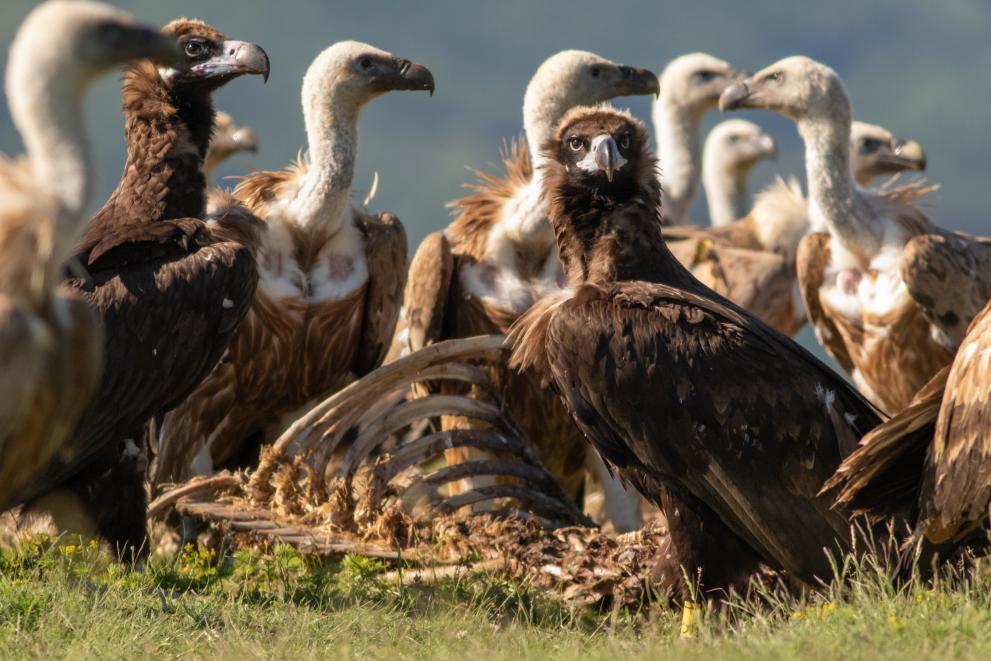
THREAT MITIGATION
Securing dangerous electric poles to reduce electrocution mortality and activities to prevent and detect crimes against nature, such as placing poisonous baits and poaching, are essential measures for vulture threat mitigation. Increasing the capacity of responsible national institutions and others is also crucial in these efforts.

EVALUATION OF REINTRODUCTION EFFORTS
Tracking the outcomes of reintroduction efforts is a critical component of conservation goals in Bulgaria and neighbouring countries. Satellite transmitters are used to mark and track the movements of reintroduced vultures, providing valuable data on their progress and behaviour. Additionally, the establishment of a robust network of local supporters plays a vital role in safeguarding these distressed vultures, contributing to their successful reintroduction and long-term survival.

PROMOTION AND TRANSFER OF EXPERIENCE
The promotion and transfer of experience in vulture conservation involve several key strategies. Firstly, the experience gained in Bulgaria regarding vulture reintroduction is shared with Romania, facilitating the exchange of knowledge and expertise. Educational activities are conducted with students to raise awareness about vultures and the challenges they face. These activities not only promote vulture conservation but also highlight the threats they encounter. Furthermore, workshops are organized for various target groups, including state and municipal administrations, hunters, and farmers, among others.

Funded by the EU’s LIFE Programme, the Bearded Vulture LIFE project is coordinated by the wildlife conservation charity “Green Balkans – Stara Zagora” NGO, and the participation of Bulgarian partners Fund for Wild Flora and Fauna (FWFF), Foundation EkoObshtnost, EVN – Elektropradelenie Yug EAD, Severozapadno Darzhavno Predpriyatie – Vratsa, “Sinite kamani” Nature Park Directorate, Vulture Conservation Foundation and the Milvus group.

Bearded Vulture LIFE (project #101113869 LIFE22-NAT-BG-Bearded Vulture LIFE) is co-financed by the European Union’s LIFE Programme. The project’s goal is to establish a new breeding population of Bearded Vultures in Bulgaria and to strengthen the Cinereous Vulture population. Its duration is 7 years, from August 2023 to July 2030, with a total budget of €5,173,446.71. The European Union provides co-financing of €3,880,085.05.
The opinions expressed in the news are those of the author only and do not necessarily reflect those of the European Union or CINEA. Neither the European Union nor the grant provider can be held responsible for them
Latest project news
Young, fearless adventurers like Dryan are making sure vulture conservation...Read More
In a promising turn for wildlife conservation, eight Cinereous Vulture...Read More
On 17 May 2025, Bulgaria will witness a historical moment...Read More
Tewes, a female Cinereous Vulture, delights scientists and nature enthusiasts...Read More
As part of the Bearded Vulture LIFE project, 17 Cinereous...Read More
On January 13-14, 2025, a pivotal meeting was held in...Read More
Living in a vulture hotspot like Extremadura, Spain, has its...Read More
In a landmark achievement for vulture conservation, Bulgaria set a...Read More
Conservation efforts for Cinereous Vultures in Bulgaria have achieved a...Read More
The four-year-old Cinereous Vulture Tewes keeps surprising scientists and nature...Read More


